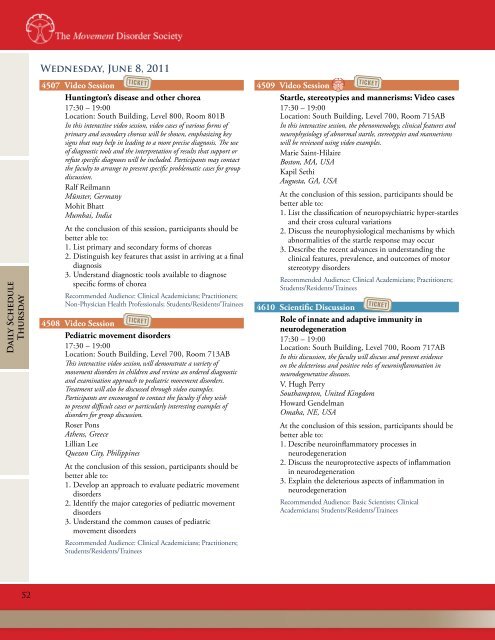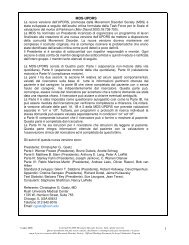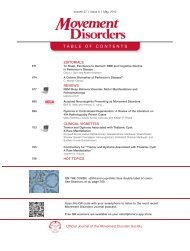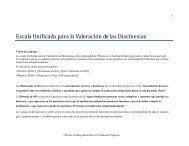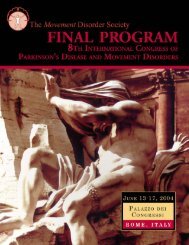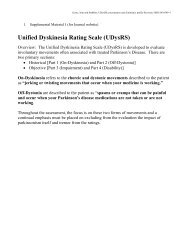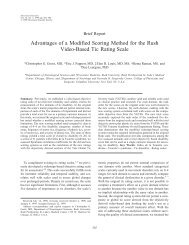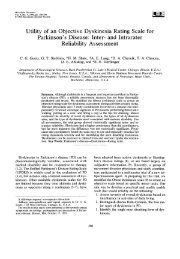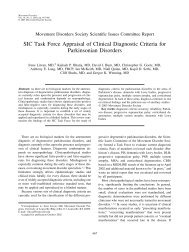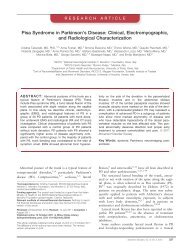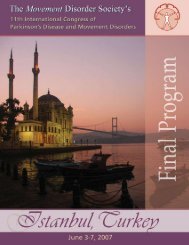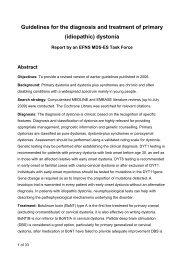15th INTERNATIONAL CONGRESS OF PARKINSON'S
15th INTERNATIONAL CONGRESS OF PARKINSON'S
15th INTERNATIONAL CONGRESS OF PARKINSON'S
You also want an ePaper? Increase the reach of your titles
YUMPU automatically turns print PDFs into web optimized ePapers that Google loves.
Daily Schedule<br />
Thursday<br />
52<br />
Wednesday, June 8, 2011<br />
TICKET<br />
4507 Video Session<br />
Huntington’s disease and other chorea<br />
17:30 – 19:00<br />
Location: South Building, Level 800, Room 801B<br />
In this interactive video session, video cases of various forms of<br />
primary and secondary choreas will be shown, emphasizing key<br />
signs that may help in leading to a more precise diagnosis. The use<br />
of diagnostic tools and the interpretation of results that support or<br />
refute specific diagnoses will be included. Participants may contact<br />
the faculty to arrange to present specific problematic cases for group<br />
discussion.<br />
Ralf Reilmann<br />
Münster, Germany<br />
Mohit Bhatt<br />
Mumbai, India<br />
At the conclusion of this session, participants should be<br />
better able to:<br />
1. List primary and secondary forms of choreas<br />
2. Distinguish key features that assist in arriving at a final<br />
diagnosis<br />
3. Understand diagnostic tools available to diagnose<br />
specific forms of chorea<br />
Recommended Audience: Clinical Academicians; Practitioners;<br />
Non-Physician Health Professionals; Students/Residents/Trainees<br />
TICKET<br />
4508 Video Session<br />
Pediatric movement disorders<br />
17:30 – 19:00<br />
Location: South Building, Level 700, Room 713AB<br />
This interactive video session, will demonstrate a variety of<br />
movement disorders in children and review an ordered diagnostic<br />
and examination approach to pediatric movement disorders.<br />
Treatment will also be discussed through video examples.<br />
Participants are encouraged to contact the faculty if they wish<br />
to present difficult cases or particularly interesting examples of<br />
disorders for group discussion.<br />
Roser Pons<br />
Athens, Greece<br />
Lillian Lee<br />
Quezon City, Philippines<br />
At the conclusion of this session, participants should be<br />
better able to:<br />
1. Develop an approach to evaluate pediatric movement<br />
disorders<br />
2. Identify the major categories of pediatric movement<br />
disorders<br />
3. Understand the common causes of pediatric<br />
movement disorders<br />
Recommended Audience: Clinical Academicians; Practitioners;<br />
Students/Residents/Trainees<br />
TICKET<br />
4509 Video Session<br />
Startle, stereotypies and mannerisms: Video cases<br />
17:30 – 19:00<br />
Location: South Building, Level 700, Room 715AB<br />
In this interactive session, the phenomenology, clinical features and<br />
neurophysiology of abnormal startle, stereotypies and mannerisms<br />
will be reviewed using video examples.<br />
Marie Saint-Hilaire<br />
Boston, MA, USA<br />
Kapil Sethi<br />
Augusta, GA, USA<br />
At the conclusion of this session, participants should be<br />
better able to:<br />
1. List the classification of neuropsychiatric hyper-startles<br />
and their cross cultural variations<br />
2. Discuss the neurophysiological mechanisms by which<br />
abnormalities of the startle response may occur<br />
3. Describe the recent advances in understanding the<br />
clinical features, prevalence, and outcomes of motor<br />
stereotypy disorders<br />
Recommended Audience: Clinical Academicians; Practitioners;<br />
Students/Residents/Trainees<br />
TICKET<br />
4610 Scientific Discussion<br />
Role of innate and adaptive immunity in<br />
neurodegeneration<br />
17:30 – 19:00<br />
Location: South Building, Level 700, Room 717AB<br />
In this discussion, the faculty will discuss and present evidence<br />
on the deleterious and positive roles of neuroinflammation in<br />
neurodegenerative diseases.<br />
V. Hugh Perry<br />
Southampton, United Kingdom<br />
Howard Gendelman<br />
Omaha, NE, USA<br />
At the conclusion of this session, participants should be<br />
better able to:<br />
1. Describe neuroinflammatory processes in<br />
neurodegeneration<br />
2. Discuss the neuroprotective aspects of inflammation<br />
in neurodegeneration<br />
3. Explain the deleterious aspects of inflammation in<br />
neurodegeneration<br />
Recommended Audience: Basic Scientists; Clinical<br />
Academicians; Students/Residents/Trainees


